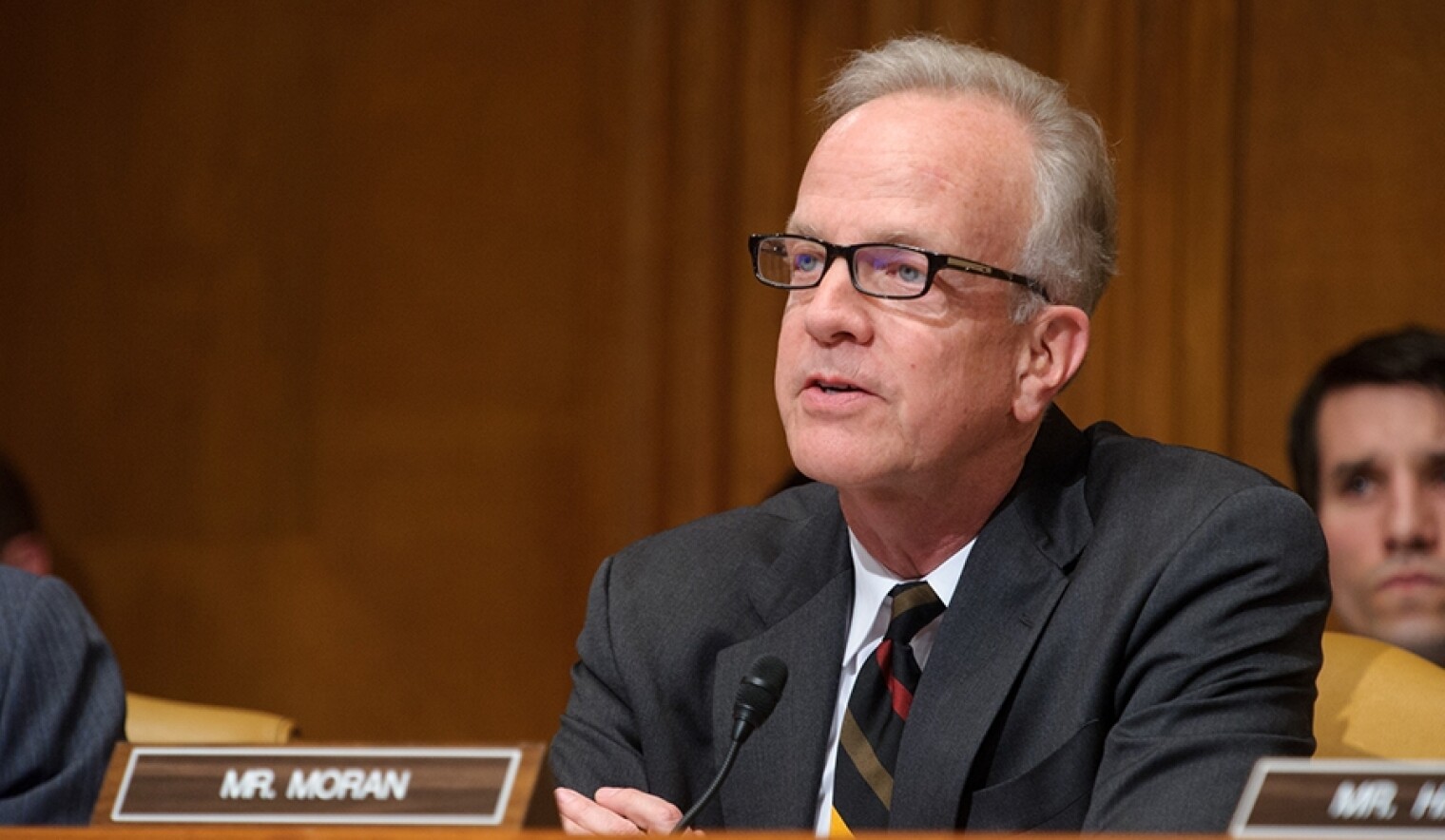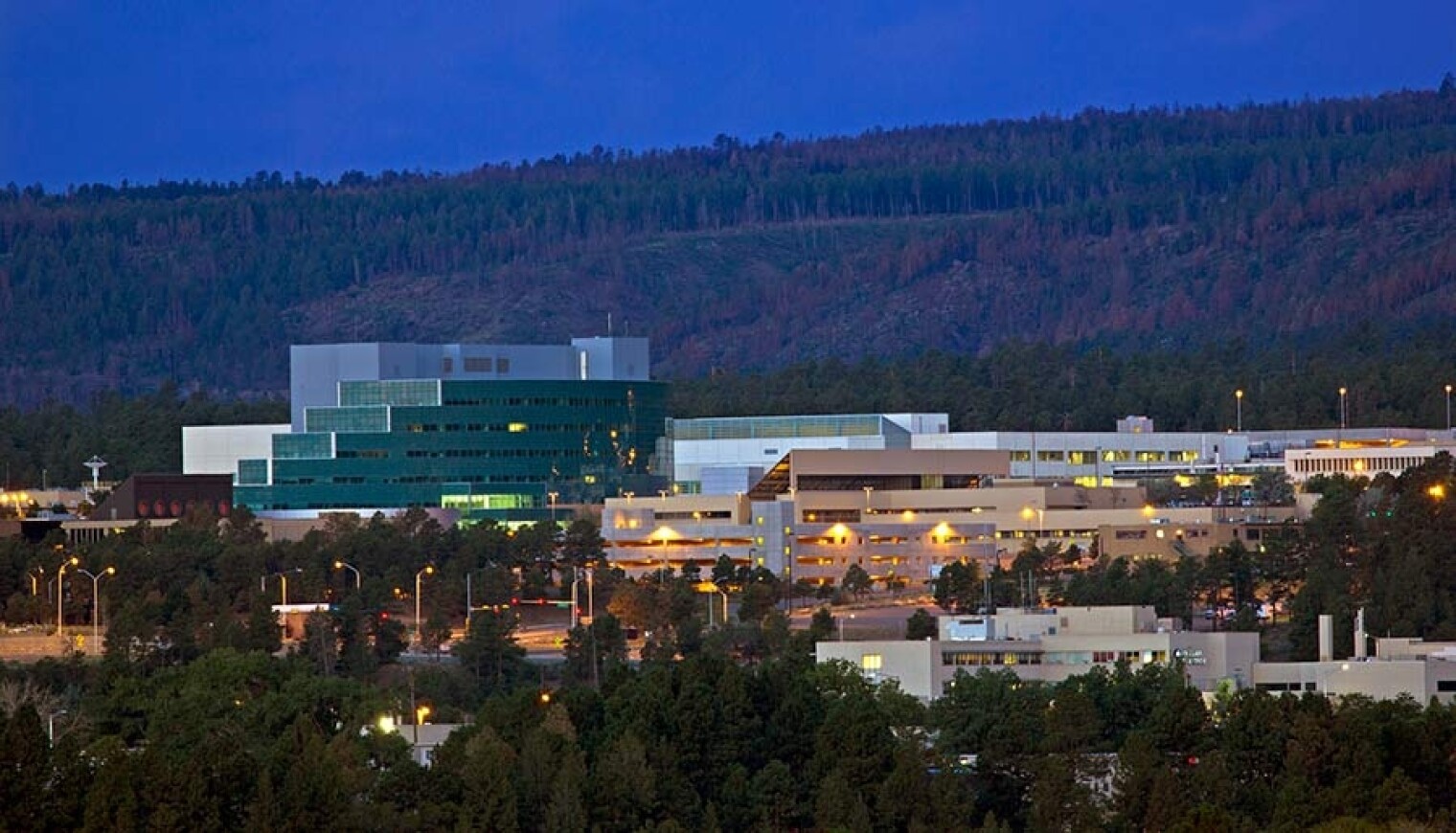| |
What’s Ahead
 |
| Sen. Jerry Moran (R-KS) succeeded Sen. Richard Shelby (R-AL) as chair of the Senate Commerce-Justice-Science Appropriations Subcommittee in April. The subcommittee will consider its fiscal year 2019 spending bill on Tuesday. (Image credit – Senate Appropriations Committee) |
Two Major Science Spending Bills on Deck in Senate
This week, the Senate Appropriations Committee is set to consider two appropriations bills that include fiscal year 2019 funding proposals for several federal science agencies: one to fund NASA, the National Science Foundation, National Institute of Standards and Technology, and National Oceanic and Atmospheric Administration; and the other to fund the U.S. Geological Survey and Environmental Protection Agency. The subcommittees responsible for each bill will meet separately on Tuesday and, pending their approval, the full Appropriations Committee will convene on Thursday to consider both bills. The bills and the accompanying reports detailing the committee’s spending proposals should be released around the time of the full committee meeting.
House Appropriations to Consider Defense Spending Bill
The House Appropriations Committee will consider its fiscal year 2019 spending legislation for the Department of Defense on Wednesday. The bill includes $91.2 billion for research, development, test, and evaluation activities, a 3 percent increase over the current level. The breakout of this funding between basic research, applied research, and later-stage R&D activities will be detailed in the committee report, which will likely be released this week.
National Defense Authorization Act Reaches Senate Floor
This week, the Senate will debate and consider amendments to the “John S. McCain National Defense Authorization Act for Fiscal Year 2019,” which the Senate Armed Services Committee approved on June 5. Consistent with recent interest in rapidly transitioning advanced military technologies into acquisition programs, the bill would grant the undersecretary of defense for research and engineering special authority over R&D in directed energy, hypersonics, artificial intelligence, and future space satellite architectures. It would also direct the under secretary to develop special procedures for expediting the availability of technologies that the military urgently needs. It also authorizes an R&D program in quantum information science. More controversially, the bill would direct DOD to begin work on a space-based missile defense system and would permit work on a new low-yield nuclear warhead. Currently, there is no provision in the bill analogous to the House provision that would deny DOD funding to researchers who have participated in Chinese, Iranian, North Korean, or Russian talent recruitment programs. The House passed its version of the legislation on May 24 on a vote of 351 to 66.
National Academies Sexual Harassment Report Set for Release
On Tuesday, the National Academies will release a study committee report, titled “Sexual Harassment of Women: Climate, Culture, and Consequences in Academic Sciences, Engineering, and Medicine.” The study co-chairs — Wellesley President Paula Johnson and MIT aeronautics professor Sheila Widnall — will speak at a press briefing, which will be webcast. Last month, the presidents of the National Academies issued a joint statement stating they are discussing revising the Academies bylaws on the standards of professional conduct of the academies’ elected members.
Science Committee Examining NASA Cost and Schedule Overruns
The House Science Committee will hold a hearing on Thursday to discuss a recently published Government Accountability Office report that found the agency’s performance in managing its largest projects deteriorated in 2017 after several years of improvement. Among NASA science missions, the James Webb Space Telescope has a particularly troubled history, and NASA announced earlier this year it would have to delay its launch again until 2020. The GAO report cited “ workmanship errors” and other complications encountered during integration of the spacecraft as major factors in the delay. Later this month, NASA will release an independent review report that will establish whether the mission will breach its $8 billion congressionally imposed cost cap. Another multi-billion-dollar program, the Space Launch System, has likewise been plagued by increasing costs and schedule delays. Testifying at the hearing will be GAO official Cristina Chaplain, NASA Associate Administrator Stephen Jurczyk, NASA Inspector General Paul Martin, and the executive director of the American Institute of Aeronautics and Astronautics, Daniel Dumbacher.
CERN Begins High-Luminosity Upgrade of Large Hadron Collider
On Friday, CERN will hold a groundbreaking ceremony in Geneva, Switzerland, to kick off construction on the High-Luminosity upgrade to the Large Hadron Collider (HL-LHC), the world’s highest-energy particle accelerator. The upgrade, scheduled for completion in 2025, will increase LHC’s particle collision rate by a factor of 10, enabling more precise studies of rare particles, including the Higgs boson, and potentially bringing new particles within reach of discovery. The U.S. is contributing to the accelerator upgrade as well as to upgrades to LHC’s two main detectors, ATLAS and CMS.
Panels to Discuss Political Interference with Climate and Energy Data
The Center for American Progress is hosting a two-hour event on Thursday titled, “Silencing Science: Risks Posed to Climate and Energy Data from Political Interference.” Speakers include Rep. Paul Tonko (D-NY), former Energy Secretary Ernest Moniz, former Obama White House Office of Science and Technology Policy official Kei Koizumi, and Union of Concerned Scientists senior fellow Joel Clement, who filed a whistleblower lawsuit prior to leaving the Interior Department last year.
|
|
In Case You Missed It
 |
| EU Commissioner for Research, Science, and Innovation Carlos Moedas presenting the proposal for the EU’s next flagship R&D framework program, Horizon Europe. (Image credit - European Commission) |
EU Releases Proposal for Horizon Europe
On June 7, the European Commission released its proposal for Horizon Europe, the next EU flagship R&D program that will run from 2021 to 2027. The nearly €100 billion ($120 billion) program budget represents a substantial increase over the current €77 billion ($88 billion) Horizon 2020 research program. According to Science|Business, the proposed budget would comprise about 10 percent of total government R&D funding from EU nations. Horizon Europe will fund three research “pillars”: €26 billion ($30 billion) for Open Science, which will focus on basic research and infrastructure; €14 billion ($16 billion) for Open Innovation, which will support bringing new technologies to market; and €53 billion ($62 billion) for Global Challenges and Industrial Competitiveness, which will fund potential solutions to social and economic problems in areas such as climate change, energy, and health. Of note, the proposal does not include contributions from the U.K., but for the first time will allow any country worldwide to participate in the program for a yet-to-be-determined financial contribution.
Senators Debate Scale of Espionage Threat Posed by Foreign Students
Senate Majority Whip John Cornyn (R-TX) held a Judiciary Committee hearing on June 6 to draw attention to espionage threats posed by foreign citizens studying at U.S. universities. Senate Minority Whip Dick Durbin (D-IL) argued that espionage by students is a minor concern relative to other national security threats, such as cyberespionage, and said he was troubled by the hearing’s focus on China. After noting his request to have Congressional Asian Pacific American Caucus Chair Judy Chu (D-CA) testify was denied, he entered into the record a written statement in which Chu argues the hearing is part of an effort to “fuel the dangerous narrative that students from China should be viewed with more scrutiny than those from other countries.” Cornyn argued that focusing on China is warranted, citing FBI Director Christopher Wray’s recent assertion that China is exploiting the open U.S. research environment and pointing to the large number of Chinese students in the U.S. relative to those from other rival nations such as Russia. While Cornyn stressed that he is “not interested in restricting student visas,” a State Department official confirmed at the hearing that starting June 11 the Trump administration plans to restrict the duration of visas granted to Chinese nationals studying certain technical subjects.
EPA Extends Comment Period on Open Science Proposal
The Environmental Protection Agency has extended the public comment period on a proposed rule that would require data and models underlying certain scientific studies to be made publicly available before the agency could use the studies in developing regulations. Since the extension was announced, EPA’s Scientific Advisory Board voted to review the rule after expressing concern that it was “developed without a public process for soliciting input from the scientific community.” Many scientific and environmental organizations have voiced strong opposition to the rule, while over 100 House members signed onto a bipartisan letter dated June 7 calling for it to be withdrawn. EPA will hold a public hearing on the rule on July 17 in Washington, D.C., and public comments are due Aug. 16.
House Passes DOE Spending Bill
On June 8, on a vote of 235 to 179, the House passed a package of three fiscal year 2019 appropriations bills, including the one that funds the Department of Energy. FYI has published summaries of both House and Senate proposals for the DOE Office of Science, DOE applied R&D programs, and National Nuclear Security Administration. No major changes were made to the House proposals during floor consideration. An amendment to defund the Advanced Research Projects Agency–Energy was defeated on a vote of 123 to 295, and an amendment to restore funding to Congress’ defunct Office of Technology Assessment was defeated on a vote of 195 to 217. Reps. Lamar Smith (R-TX) and Randy Weber (R-TX) withdrew proposed amendments to increase spending on certain major DOE research facility construction projects, urging the matter be revisited in negotiations over Congress’ final spending legislation. The Senate has not yet scheduled a floor debate on its corresponding bill.
House Appropriators Approve USGS, EPA Spending Bill
Last week, the House Appropriations Committee approved its fiscal year 2019 Interior-Environment spending bill, which funds the U.S. Geological Survey and Environmental Protection Agency, on a vote of 25 to 20. Under the bill, funding for EPA’s Science and Technology programs would decrease 9 percent to $651 million. Within a 2 percent overall funding boost for USGS, all research mission areas would benefit except Ecosystems and Natural Hazards, although it would also ramp up funding for the ongoing rollout of the ShakeAlert earthquake early warning system. It would also fully fund USGS’ Landsat-9 land imaging satellite program. The report accompanying the bills contains detailed funding proposals, and further details for USGS are available in FYI’s Federal Science Budget Tracker.
Sen. Harris Proposes Defense Quantum R&D Consortium
Sen. Kamala Harris (D-CA) introduced a bill on June 5 to direct the Defense Department to establish a Defense Quantum Information Consortium, which would award research grants to consortium members in universities and private industry. In a statement, Harris said that “without adequate research and coordination in quantum computing, we risk falling behind our global competition in the cyberspace race which leaves us vulnerable to attacks from our adversaries.” The House Science Committee is currently developing separate legislation that is focused on civil science agencies and would create a National Quantum Initiative.
NSF Board Calls for Facility Funding Flexibility
In a congressionally mandated study released on June 6, the governing board of the National Science Foundation recommends that NSF’s agency-wide account dedicated to major research facility construction be permitted to support facility operations and maintenance (O&M) and divestment costs in certain situations to alleviate budgetary pressures. Although the board concludes that rising facility O&M costs are not a primary driver of declining grant application success rates across NSF and that creating an agency-wide O&M account is not warranted at this time, it stresses that O&M costs have had an outsized impact on certain facilities-centric branches such as the Astronomical Sciences and Ocean Sciences Divisions. Among its other recommendations, the board says NSF should adopt longer planning horizons such as those used by the Department of Energy Office of Science.
Senate Hearing Probes NASA Plan to Divest from ISS
At the Senate Commerce, Science, and Transportation Committee’s second recent subcommittee hearing on the International Space Station (ISS), committee members and witnesses supported the eventual privatization of low-Earth orbit, but strongly opposed the Trump administration’s plan to transition operation of the ISS to a commercial entity in 2025. Subcommittee Chair Ted Cruz (R-TX) called the proposal “ the height of foolishness” and emphasized that any decisions about the space station remain the prerogative of Congress. Cynthia Bouthot of the Center for the Advancement of Science in Space, which manages the U.S. segment of ISS as a national laboratory, stressed that, while the station already attracts commercial customers, more time would be needed to transition it to a “commercially sustainable” business model.
Los Alamos Contract Awarded to Battelle, University of California, Texas A&M
On June 8, the Department of Energy announced it has awarded a new, five-year contract for the management and operations of Los Alamos National Laboratory to Triad National Security LLC, a consortium comprising Battelle Memorial Institute, the University of California (UC), and Texas A&M University. The competitive contract, valued at $2.5 billion annually, will begin in October and can be extended for up to a total of 10 years. In a multi-month transition starting this fall, the lab’s management will change hands from Los Alamos National Security LLC, the group comprising Bechtel, UC, and several other partners that has managed the lab since 2006. Los Alamos has come under fire in recent years following a series of safety violations that resulted in a shutdown of its plutonium facility from 2013 to 2015.
 |
| Los Alamos National Laboratory in New Mexico is the largest of the Department of Energy’s 17 labs, with a budget of $2.2 billion in fiscal year 2018. (Image credit - LANL) |
|
|
Events This Week
DOE: Basic Energy Sciences Advisory Committee 40th anniversary report release
12:30 pm, Lewis-Burke Associates (440 1st St. NW, DC)
RSVP to helenh@mit.edu
|
|
Opportunities CIA Seeking Science, Technology, and Weapons Analyst
The Central Intelligence Agency is accepting applications for a science, technology, and weapons analyst within its Directorate of Analysis. Position responsibilities include conducting threat analyses of weapons or technology and communicating findings to senior decision makers, among other duties. Interested individuals with a bachelor’s or master’s degree in a STEM field and foreign language capability are encouraged to apply.
University of Michigan Seeking Federal Relations Staff
The University of Michigan is accepting applications for a federal relations associate or manager position in its Washington, D.C., office. The individual is responsible for following agency activities that impact university priorities, attending task force and coalition meetings, preparing weekly updates for university leadership on federal policy activities, among other duties. Individuals with a bachelor’s degree and 2-3 years of experience in higher education or research policy should apply by June 16.
AGU Accepting Public Affairs Internship Applications
The American Geophysical Union is accepting applications for its fall public affairs internship. Interns will attend congressional events, write blog posts and articles, and assist the public affairs team in organizing the Geoscience Congressional Visits Day, among other responsibilities. Interested individuals should have completed two years of coursework towards a degree in Earth or space sciences.
Know of an upcoming science policy opportunity? Email us at fyi@aip.org.Know of an upcoming science policy event? Email us at fyi@aip.org.
|
|
Around the Web
News and views currently in circulation. Links do not imply endorsement.
White House
Congress
Political Engagement
Science, Society, and the Economy
Education and Workforce
Research Management
Labs and Facilities
Energy
Space
Weather, Climate, and Environment
Defense
Biomedical
International Affairs
|
|
|
| |
| |
|


